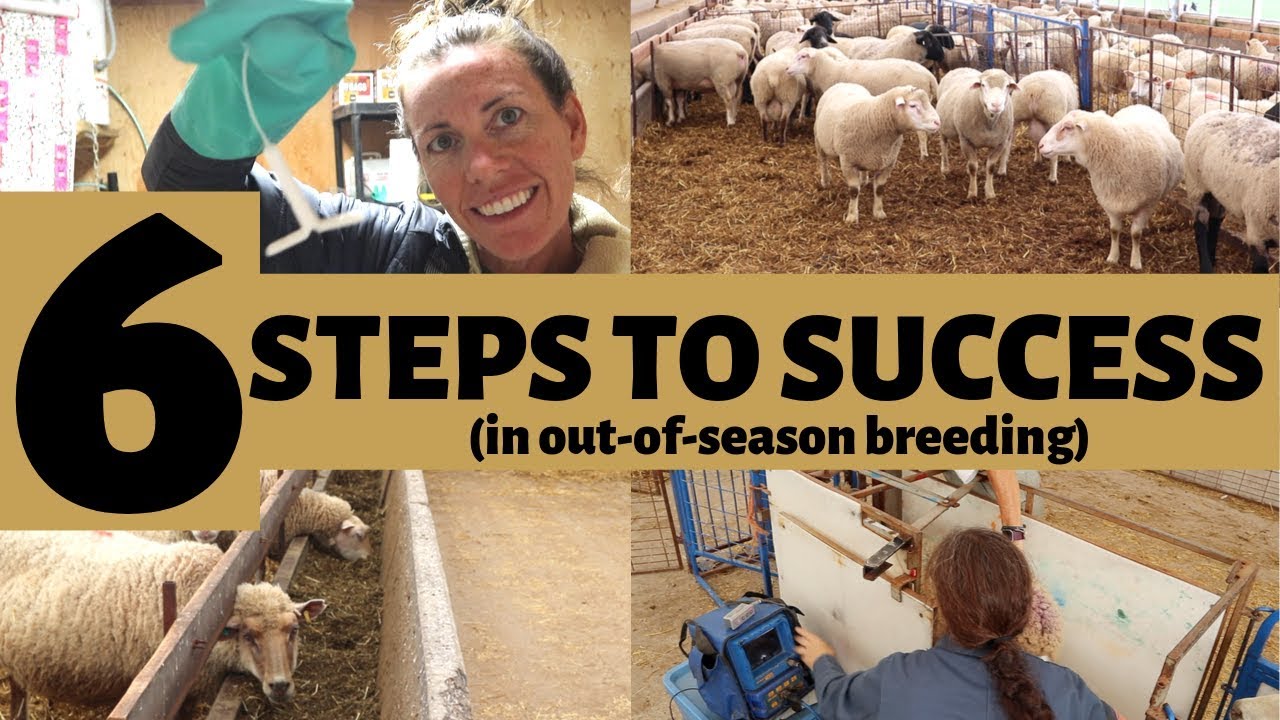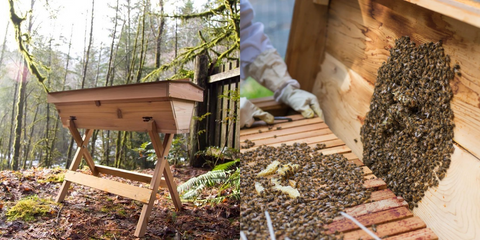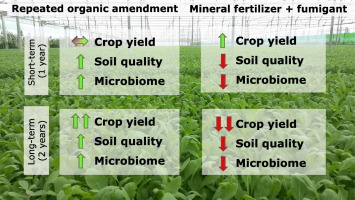To succeed in sheep farming, consider tips such as investing in healthy breeding stock, maintaining a clean and comfortable environment, providing proper nutrition, monitoring their health regularly, managing their wool production, and having a solid business plan. Raising sheep can be a profitable venture that requires a lot of patience, hard work, and expertise.
As a sheep farmer, you need to be knowledgeable about how to care for your flock and identify potential problems that may affect their health and productivity. We will delve into the essential tips that you need to know for successful sheep farming.
By following these tips, you can ensure that your sheep stay happy and healthy, and your business can thrive.
Table of Contents
Start With The Right Breeds
Selecting the right sheep breed for your farm is one of the key factors in successful sheep farming. It’s important to take into account factors like climate, feed availability, and desired products to ensure you choose breeds that will thrive and meet your goals.
Consider Different Breeds For Their Traits
Choosing the right breeds of sheep is a crucial factor for any successful sheep farming. As a farmer, you need to consider different breeds for various traits like wool production, milk yield, and meat production. Each breed has its unique set of characteristics, and it’s essential to choose the one that aligns with the goals of your farm.
Here are some popular breeds that you can consider:
| Breeds | Characteristics |
|---|---|
| Merino | High-quality wool |
| Dorset | Early breeding and good for meat production |
| Rambouillet | Hardy and adaptable with good wool |
| Suffolk | Fast-growing and good for meat production |
Choose Breeds That Are Best Suited For Your Farm’s Climate
While considering different breeds, you must also keep in mind the climate conditions of your farm. Some breeds thrive better in cold climates, while others do well in warm climates. Hence, when choosing sheep breeds, ensure that they are well adapted to your farm’s specific climatic conditions.
For example, if your farm experiences hot and humid weather, then you would require breeds that can tolerate such conditions. Some breeds like Barbados Blackbelly and St. Croix can thrive in such conditions and are resistant to parasites, making them suitable for farms in warmer climates.
Ensure The Breeds Have Good Health And Fertility
Having healthy and fertile sheep breeds is vital in ensuring a productive and profitable farm. You must ensure that the sheep breeds have good health records and are free from any diseases. Additionally, you should also consider the fertility traits of the breeds, such as the number of lambs per pregnancy and lamb survival rate.
In conclusion, starting with the right breeds is the foundation of any successful sheep farming. By considering different breeds, choosing the one suited for your farm’s climate, and ensuring breed health and fertility, you can set your farm on the path to success.

Credit: www.iamcountryside.com
Create Proper Grazing Management Plans
Proper grazing management plans are essential for successful sheep farming. It is important to maintain good pasture conditions and rotate sheep regularly to prevent overgrazing. Effective management can lead to increased productivity and profitability for your farm.
Proper grazing management plans for sheep farming is essential for ensuring the flock’s health, maximizing productivity and protecting the environment. Grazing management involves giving sheep enough pasture resources at the right time, avoiding overgrazing and creating an efficient rotation of grazing areas. In this section, we will provide 3 crucial tips for creating a proper grazing management plan.
Ensure Pastures Are Adequately Fenced And Maintained
One of the most critical aspects of grazing management is ensuring the pasture areas are properly fenced and maintained. Fences prevent sheep from leaving the grazing area and keep out predators, while maintaining the area ensures a healthy pasture. Inspect the fence regularly and repair any damages to prevent animals from wandering, leading to overgrazing and soil erosion.
Rotate Grazing Areas To Prevent Overgrazing
Rotating grazing pastures ensures the sheep do not graze in the same area for too long, which can lead to overgrazing and pasture fatigue. Pasture fatigue happens when sheep consume most of the vegetation in a given pasture, leading to slow regrowth of vegetation. Plan pasture rotations for different seasons and avoid overusing pastures. Rotating between three grazing areas is an excellent practice, giving as much as a month to regrow the vegetation.
Divide Pastures According To The Animals’ Needs, Ensuring Each
Different flocks of sheep have varying pasture needs, and it’s essential to divide grazing pasture accordingly. Creating subdivisions allows for customized pasture management that suits the needs of each group. Sheep of different genders, breeds, ages, and production requirements differ in nutritional needs and grazing habits. Grazing management for lambs and ewes differs since lambs need more nutrition for growth and milk production.
In conclusion, implementing these grazing management plans creates a healthy pasture, maximizes the productivity of your flock, and helps protect the environment. Adequate fencing and maintenance, pasture rotation, and division of pastures guarantee smooth grazing management.
Provide Proper Nutrition & Water
Proper nutrition and water are crucial for successful sheep farming. To ensure the health and productivity of your flock, offer them a balanced diet and clean, fresh water at all times. Proper nutrition and hydration can reduce the risk of various diseases and increase the quality of wool and meat.
Sheep farming is a popular industry, and the key to success lies in providing them with proper nutrition and water. Proper nutrition is essential to ensure their overall growth and productivity. A balanced diet containing roughage, minerals, and clean water is necessary for their health and well-being. In this post, we will discuss six crucial tips for successful sheep farming with a focus on the importance of providing proper nutrition and water.
Ensure Sheep Have Proper Nutrition According To Their Stage Of Life
Sheep have different nutritional requirements at different stages of their lives. For example, pregnant ewes require a diet that is rich in energy and protein to support the healthy growth of their lambs. A diet that is low in energy and protein can have adverse effects on their weight and overall health. Therefore, it is essential to ensure that the nutrition provided is specific to their stage of life.
Feed Sheep A Balanced Diet Including Roughage, Minerals And Clean Water
A balanced diet for sheep should contain roughage, minerals, and clean water. Roughage is essential for their digestive health and includes hay, silage, and fresh pasture. Additionally, minerals such as calcium, phosphorus, and salt also need to be included in their diet to maintain healthy bones and teeth. Clean, fresh water should be available to them at all times, as it is essential for their digestion, hydration, and overall well-being.
Supplement Diets To Ensure Nutritional Needs Are Being Met
Supplementing diets with vitamins, minerals, and other nutrients can ensure that their nutritional needs are being met. Sheep require various nutrients, and supplementing their diets can help meet their nutritional requirements. However, supplements should be used with caution and should not be used as a substitute for a well-rounded, balanced diet.
Provide Good Quality Feed And Avoid Moldy Feed
Feeding sheep good quality feed is crucial to their health, growth, and productivity. Only feed high-quality hay and silage to avoid any adverse effects on their health. Additionally, moldy feed can have significant adverse effects on their health and should be avoided at all costs.
Do Not Overfeed Sheep
Overfeeding sheep can lead to obesity and affect their overall health and productivity. Therefore, it is essential to provide them with the correct amount of feed and avoid wastage. Monitor their weight regularly and adjust their diet accordingly to ensure they are not overfed.
Ensure Clean Water Supply
Sheep require a constant supply of clean, fresh water. Ensure the water supply is clean and free from any harmful substances. Dirty water can lead to various health problems and affect their productivity.
In conclusion, providing proper nutrition and water is crucial to ensure successful sheep farming. A balanced diet containing roughage, minerals, and clean water specific to their stage of life is necessary for their health and well-being. Supplementing their diet, providing good quality feed, avoiding overfeeding, and ensuring clean water supply are the key factors in successful sheep farming.

Credit: www.farmprogress.com
Manage Health And Parasites
To successfully manage health and parasites in sheep farming, it’s important to maintain clean living conditions, regularly monitor for signs of illness and parasites, provide proper nutrition and hydration, and work with your veterinarian to create a health plan. Additionally, practicing rotational grazing and implementing a quarantine protocol for new animals can also be effective preventative measures.
As a sheep farmer, it is crucial to prioritize the management of your livestock’s health and parasites. Maintaining their well-being is a significant factor in ensuring your farm’s success. Sick and infested sheep can lead to reduced production, decreased revenue, and potentially damage your operation’s reputation.
Create A Vaccination Plan With A Veterinarian
One of the most effective ways to prevent diseases is through vaccinations. It is recommended to work with a veterinarian to develop a vaccination plan specific to the needs of your flock. This plan should outline the appropriate vaccines for each age group and the proper timing for administering them. Keep a record of all vaccinations to ensure the appropriate boosters are given at the right intervals.
Implement A Parasite Management Program
Parasites thrive in warm and moist environments, so it is essential to have a plan in place to manage them. Develop a parasite management program with your veterinarian, considering your sheep’s age and possible parasite exposure. The program should include regular fecal examinations and treatment, rotating pastures, and proper flock nutrition.
Monitor For Signs Of Illness And Injury And Address Promptly
Regularly monitoring your sheep can help detect early signs of illness and injury. It is essential to act quickly and address any issues promptly. Isolate infected animals and seek veterinary advice when necessary. Daily visual exams of your flock can also help detect injuries such as hoof problems, which can be corrected with timely trimming.
Provide Clean And Comfortable Living Conditions
Sheep require clean and comfortable living conditions to thrive. Ensure that the barns, pens, and pastures are kept clean, dry, and well-ventilated. Dirty and wet conditions can lead to bacterial and fungal infections, ultimately compromising your livestock’s health.
Encourage A Balanced Diet
A balanced diet is essential to your sheep’s health, growth, and production. Ensure that their food and supplements provide the appropriate nutrients to meet their individual needs. Supply clean water, and adjust the diet to the sheep’s different life stages, such as lambs, ewes, and rams.
Practice Proper Hygiene Standards
Practicing proper hygiene standards is key to preventing the spread of disease. Ensure proper ventilation, sanitization of equipment, and frequent hand washing when handling your flock. Avoid wearing the same clothes when tending to different animals or pens.
In conclusion, sheep farming is a rewarding experience but requires consistent attention to ensure their health and well-being. Regularly monitor your flock for signs of illness and injury, practice proper hygiene, and develop a parasite management and vaccination program with the guidance of a veterinarian. By practicing these tips, you will help ensure your sheep remain healthy and productive while contributing to your farm’s success.
Ensure Proper Housing And Sanitation
Proper housing and sanitation is crucial for successful sheep farming. Ensure that the sheep have adequate shelter and are kept in a clean environment to prevent the spread of diseases. This will lead to healthier sheep and ultimately higher profits for the farmer.
Keeping sheep in good housing is essential for their health and productivity. Housing areas should be designed and maintained to keep sheep safe, comfortable, and healthy. Sanitation is also crucial to prevent the spread of disease and maintain healthy sheep.
Design And Maintain Adequate Shelter
Sheep require adequate shelter from the elements, whether it is extreme heat, cold, rain, or snow. The housing should be designed to provide enough space for each sheep, and the roof should be sloped to prevent water accumulation. The shelter should be sturdy and well-ventilated to ensure a steady flow of air, which can reduce the risk of respiratory illness.
Keep Housing Areas Clean And Well-ventilated
A clean and well-ventilated environment is critical for the health of sheep. Dirty and damp living conditions can cause respiratory disease and other health problems. Regular cleaning and disinfecting of housing areas can prevent the spread of bacteria, parasites, and viruses. Ventilation systems should be well-maintained to ensure a steady flow of clean air for the sheep.
Create Separate Areas For Lambing Or Sick Animals
Separate areas should be available for lambing and sick animals to ensure proper care. This can also reduce the risk of spreading disease to healthy sheep. The lambing area should be quiet and safe for newborns, and the sick bay should be separate from other areas to prevent the transmission of illness.
In summary, adequate housing and sanitation are critical aspects of successful sheep farming. Proper design and maintenance of housing areas, regular cleaning and disinfecting, and separate areas for lambing or sick animals can help keep sheep healthy and productive.
Develop Business And Marketing Plans
For successful sheep farming, developing a comprehensive business and marketing plan is crucial. Key factors to consider include your target market, product pricing, promotional strategies, and budget allocation. A well-crafted plan can help you achieve your goals and set you up for long-term success in the industry.
Develop Business and Marketing Plans:
For successful sheep farming, it’s essential to develop business and marketing plans that address the “what, where, and how” of your sheep farming business. Without a comprehensive business plan in place, it can be difficult to meet the needs of your customers, ensure a steady stream of income, and make informed decisions to grow your business. Here are some H3 headings that can help you create a successful business and marketing plan for your sheep farming business.
Create a comprehensive business plan:
A comprehensive business plan is a roadmap to success for any business, including sheep farming. A good business plan should outline your business goals and objectives, your target customers, your unique selling proposition (USP), your marketing strategies, operational plans, and financial projections. A good business plan should be data-driven, well-written, and easy to understand.
Assess market demand and pricing:
One of the most important aspects of any successful sheep farming business is market demand. Before you start your sheep farming business, you need to assess the market demand for your product and the pricing strategies of your competitors. This can help you identify the best marketing strategies, the right pricing structures, and the potential sales channels for your products. Evaluating the market demand and pricing trends can save you time, money, and resources while helping you make informed business decisions.
Identify potential sales channels and build relationships:
Identifying potential sales channels and building relationships is an essential part of developing a successful business plan for your sheep farming business. You need to identify the potential sales channels that can help you reach your target customers, such as local markets, online marketplaces, and specialty stores. Building relationships with key market players, such as retailers and wholesalers, can help you increase your brand visibility, build trust and grow sales.
In conclusion, developing a comprehensive business and marketing plan for your sheep farming business is crucial for success. By creating a business plan, assessing market demand, and identifying sales channels and building relationships, you can improve your chances of success and scale your business effectively. Remember, success in sheep farming requires hard work, dedication, and a well-developed business plan that caters to the needs of your customers.

Credit: www.copiacove.com
Conclusion
To sum it up, successful sheep farming requires a solid foundation of knowledge, care, and attention to detail. By following the tips mentioned in this blog post, you can increase your chances of running a successful and sustainable sheep farm.
Remember to prioritize the health and well-being of your flock, implement good management practices and keep an eye on market trends. With patience and hard work, your sheep farming enterprise can thrive.









